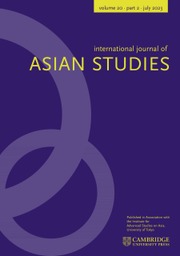No CrossRef data available.
Article contents
Modern China's financial obligations and strategies, 1901–1925: the depreciation of tael, the Austrian loans and the gold franc
Published online by Cambridge University Press: 27 April 2023
Abstract
The financial burden of the Boxer Indemnity forced the Chinese government to change its behaviours since 1901. This article re-examines the position that the decision to honour indeminity obligations enabled the Chinese state to maintain peaceful relations with western powers during the first quarter of the twentiety century. The 1901 edict affirming that China would re-examine its capacity to satisfy its international commitments. Before this edict, China had selectively followed its Sino-foreign treaties, but thereafter, China completely assumed all of her financial obligations to foreign creditors. These changes in behaviour helped China restore its deteriorated foreign relations and were followed by Provisional Executive Duan Qirui until 1925. These changes can be illustrated by three cases, namely the depreciation of tael, the Austrian loans, and the gold franc. The cases were highly international as the first concerned eleven foreign creditors, the second concerned two, and the third concerned three. From 1901–1925, foreign powers also provided China with reciprocal favours in exchange for China's responsible behaviours. Eventually, China retrieved its tariff autonomy in 1930.
- Type
- Research Article
- Information
- Copyright
- Copyright © The Author(s), 2023. Published by Cambridge University Press



